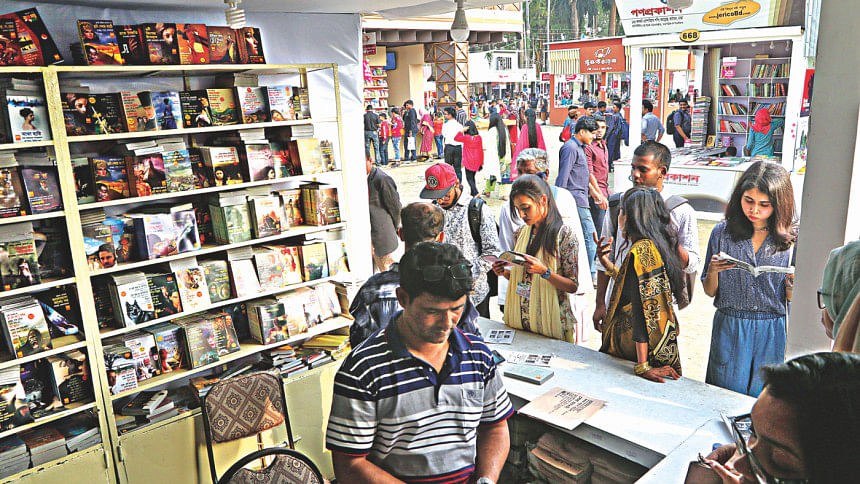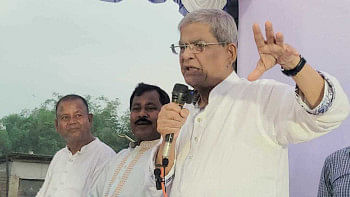Undying allure of homegrown classics

Stuck in an inescapable situation or pitted against a ruthless maniac determined to destroy the stability of the free world, what will our protagonist do, how far will he or she travel to save us -- these are the nail-biting cliffhangers that compel us to turn the pages of a thriller and finish it in one sitting.
It has been more than 55 years, yet the appeal of these books from Sheba Prokashoni have not diminished.
Enthusiasts of mystery, crime, thriller, spy, western and suspense novels continue to swarm its stall (648-649) at the Suhrawardy Udyan section of Ekushey book fair to buy titles of their choices.
Even parents, after letting their children enjoy "Shishu Prohor" (Children's Hours) on the weekends or buying books for them, were seen rushing to the stall to relive childhood memories.
After all, very few publishers can boast the fan following Sheba has; this evergreen publication house continues to enthrall readers across generations.
During multiple visits to this year's book fair, this correspondent saw an almost impenetrable crowd at its stall every time.
There were no books laid out on a table, unlike other stalls. Bookworms were picking up catalogues, looking through those diligently and asking the attendees to hand them the books from the shelves.
None were seen leaving the stall without Sheba's iconic paperbacks in newsprint and a smile on their face.
"I have been reading Tin Goyenda [three detectives] series since I was in sixth grade," said Taslima Anwar, a private job holder. "I'm trying to introduce my son to the world of Kishore, Robin and Musa," she said smilingly.
The Moghbazar resident bought Tin Goyenda volume 1 and 2 for her 10-year-old son Sabuj on Monday.
Based on English detective novels, Tin Goyenda was first published in 1985. The creator of the series, Rakib Hasan, introduced the story of three teenage amateur detectives, and opened the window to a new and exhilarating world among countless readers.
He wrote 160 stories at a stretch, before Shamsuddin Nawab took the helm of the series.
Tania Sultana, a student of Shahjalal University of Science and Technology, bought 16 books from Sheba yesterday. "I started reading these books in my school years, and never stopped."
This correspondent also met Raihan Sadik, carrying around 20 books. When asked, the Narayanganj resident said he bought some juvenile classics and detective novels for his son.
"I was a die-hard enthusiast of Sheba's translated classics. Now my son has also become a fan," said the proud father.
His son Arman Sadik, a fifth grader, said, "I was eagerly waiting to collect the volumes of Tin Goyenda. I also bought classics by Henry Rider Haggard, Mark Twain and Robert Louis Stevenson."
A major attraction of the publication house still remains Masud Rana, one of the most beloved characters created by Sheba Prokashoni founder Qazi Anwar Hussain. The first Masud Rana story was published in 1966.
The 83-year-old author has written the 463rd title of the series -- titled "Chhaya Ghatak" -- which arrived this month.
Rana, the valiant Bangladeshi spy, who travels the world on secret missions, continues to attract new and old readers alike. The plot of the spy thriller was influenced by western novels, but that does not dissuade bookworms at all.
Mominul Islam, a staff member at the busy stall, said, "Not just the old editions, book lovers are also buying the latest ones. The new edition of Tin Goyenda (volume 152) and Masud Rana are in high demand."
Some also complained that many of their favourites were not published this time.
Long used to such demand, stall attendees assured them they will get those books soon at their Segunbagicha office.
Meanwhile, conversations surrounding Sheba stall were quite lively as well.
"Masud Rana books have it all," said Aroti Dutta, a school teacher. "Rana is ruthless yet sensitive, and suave with a license to kill," she said with a smile.
Her husband, Amal Dutta, an accountant, retorted, "May be so… but I still prefer westerns by Qazi Mahbub Hossain."
In between their lively banter, many others shared their preferences enthusiastically. Most leaned towards Tin Goyenda, some chose translation of English classics while others were undecided amid young adult and thriller genres.
No matter what their preferences are, one thing is certain -- Sheba books will live forever in the hearts of readers and inspire generation after generation. They are after all a perfect reflection of the tag line -- Sheba boi, priyo boi, oboshor-er shongi.

 For all latest news, follow The Daily Star's Google News channel.
For all latest news, follow The Daily Star's Google News channel. 



Comments